This article is Part 2 in a real-time series about raising a guide dog. Also read Adventures in Raising a Guide Dog, Part 1, Part 2, and Part 4.
In the summer of 2021, my husband and I volunteered to raise a puppy for an organization that provides guide dogs to people who are visually impaired or blind. We agreed it would be my project and a few weeks later we were given Lester, a 10-week-old black Labrador Retriever. She weighed 18 pounds, smelled like cookies, and was completely untrained.
At the outset I knew that Lester would someday move on to her formal guide dog training and eventual placement with her forever person. What I did not know is how difficult it would be to train her, how easy it would be to fall in love with her, and how devastating it would be to give her up.
I previously wrote about our first several months together. This is the third, and final, instalment of our adventures, taken from my puppy raising journal.
Once Lester gets the post-spay surgery “all clear” from the vet, we jump back into our busy schedule. Our first day out Lester is the perfect mix of eager, focused, and relaxed as we grocery shop, meet a friend for lunch and visit my dentist. Throughout the day Lester checks in with me more often than before, as though she wants to make sure I will not leave home without her again. I wish she could understand how much I missed her constant company.
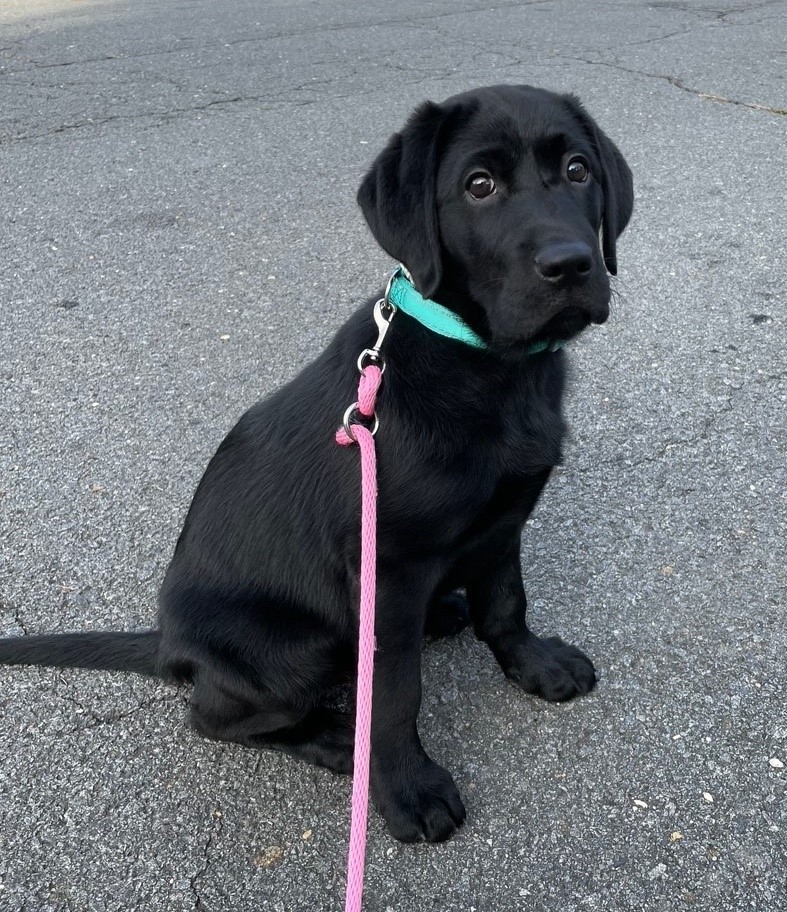
Later that month, my husband and I take a two-week vacation for the first time in several years. I line up three different places for Lester to stay while we are gone, all puppy raisers she knows from previous playdates or visits. Adjusting to different environments and handlers is an important part of her training, so I am happy to learn that while I enjoy my holiday Lester is behaving during her break. Our flight back gets in too late to pick up Lester, which gives me a night and a morning at home without her. I did not miss her while I was away, but now the house is too quiet, and I can’t wait to see her again. Lester gives us an energetic, wiggly welcome when we arrive to pick her up but is slow to get in the car, as though she is waiting for the sitter to give permission. This kind of adaptability is exactly what she will need when it comes time to bond with her forever person, but I still feel a pang.
The following month, I take Lester grocery shopping. She is familiar with the routine and knows when and where to stop and wait. While I put apples in my cart, I notice Lester is watching another shopper. I follow her gaze and see a man about 15 feet away with his back to us. He is about my husband’s height and build and is dressed like my husband in black sweatpants and a red baseball cap. At first, I wonder if Lester thinks it is my husband and is trying to connect with him. Then it hits me: Lester is going to look for us once she is with her forever person. I wonder how long we are going to look for Lester.
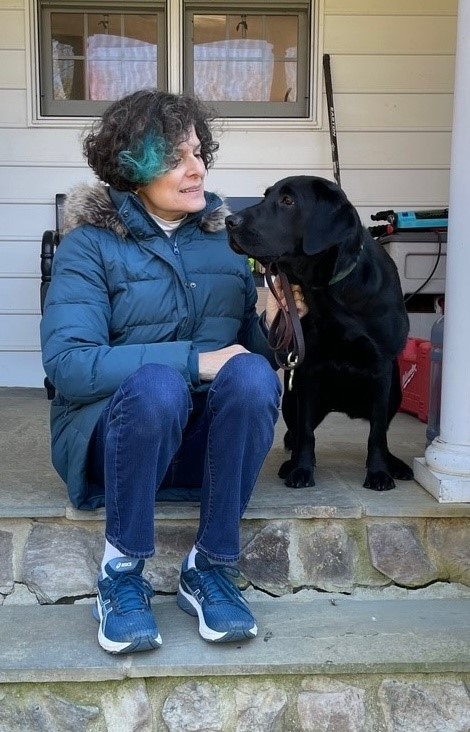
In early December Lester is invited to meet Jasper, an older, gentle horse that belongs to a friend and fellow puppy raiser. We drive for an hour through rolling, open countryside and find a vast property with several stables. Lester is on high alert as soon as I turn off the car. Jasper’s person brings him out of his stall once I settle Lester into a sit a few feet away. Jasper nods at Lester and seems nonplussed. Lester is all big eyes and contained energy, probably thinking this is the biggest dog she has ever seen. Once introductory sniffing is complete, Jasper, his human, Lester, and I take a long, loose leash walk around the property. We pass several paddocks with other horses that wander over to the fences to say hello when they see us. I walk Lester closer, and she greets everyone calmly as her tail sweeps back and forth, showing her delight.
The next day during a puppy class at the local mall I tell the instructor about our Jasper adventure and how proud I am of the way Lester behaved.
“Of course, she did well,” the instructor said. “She’s totally there,” she says as she leans over and gives Lester’s face a shmush. Then she says to Lester, “Yes, you’re ready, aren’t you?” and then she spins around and announces to the class we are going to practice going up and down some open back stairs.
The rest of the class is a blur. I try to unhear what the instructor said and think “There? Ready? Please do not let that mean what I think it means – that Lester is ready to move on to her formal training. She cannot be ready. I am not ready.”
Then one day before Lester’s sweet 16-month-birthday, the instructor calls to tell me that Lester is scheduled to go in for her formal guide dog training in five weeks. I want to protest and tell her Lester is not ready, but I know she is. Lester is delightful: responsive to my commands, well-behaved everywhere we go, and relaxed at home. There is nothing more I can teach her. I hold my breath as the instructor gives me the transport information and wait until we hang up before I burst into tears.
I have known all along the day would come when Lester would leave; together, we have worked very hard to prepare her for the next step of her journey to become a guide dog. I don’t remember the exact moment I fell in love with her or the exact moment she went from being a 10-week-old untrained and unpredictable puppy to the happy, confident, well-behaved grown up she is now. But how am I supposed to say goodbye to her — likely forever — when the day comes?
Lester seems to want to show me how ready she is, just as she wanted to show me how she knew exactly what to do on her first two plane rides. I take her to a doctor appointment and she “stays” in her “place” while I am examined and treated. When we arrive at the vet for her 16-month checkup and vaccines, I realize I do not have my treat pouch, but I needn’t worry. Lester greets the other pup-patients in the lobby like she is running for class president, and after she smothers the vet in kisses, Lester allows her to prod, poke, and vaccinate her without flinching.
I try to keep our days as routine as possible, for both of our sakes. I make sure we continue to practice our commands and behaviors, and I heavy up our playdates with her neighborhood pals Bruce and Luna. Their humans are very sad to learn Lester is leaving and ask me to keep them posted with her progress, which I will. Some of the other puppies and people in her program come by for one last playdate or cuddle. We also visit my brother and sister-in-law’s dogs Mack and Phil as often as possible. I want Lester to take memories of the fun they have together with her. If I could send along photos of her friends (and us!) to be put up in her new kennel I would, but I am told to only send one chew toy for the ride. Lester will be given new toys when she gets to the training facility.
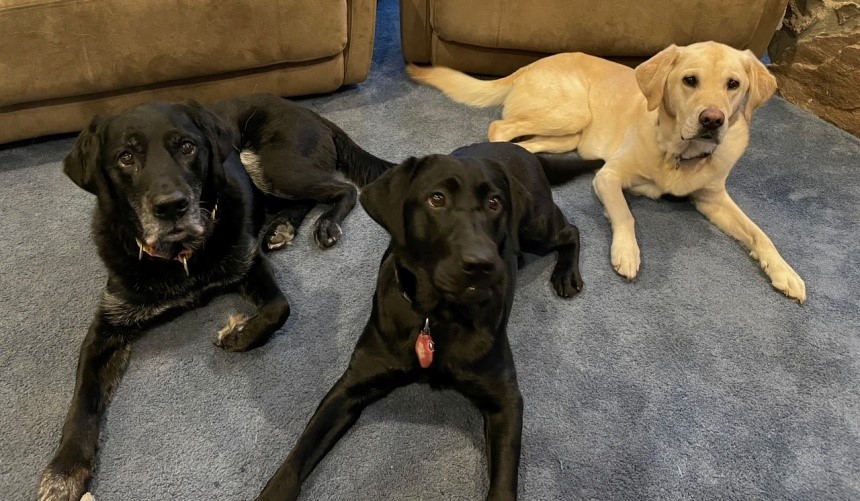
It is the quiet moments with Lester that are the most difficult, and I am determined to not let her sense my sadness. I wonder if I am fooling her by being too quick to smile when I feel the tears well up, which they do in force when we are gentling down in the evenings and before bed, as though I am mourning the loss of another precious and wonderful day with her. Our last night together, before I turn out my light, I see Lester’s brown eyes watching me, as usual. I gather all my emotional strength to paste a smile on my face and tell her she is beautiful, loved, and destined to change her forever person’s life in the best of ways. I tell her someone unlucky enough to need her is going to be very lucky to have her. I tell her we will always be connected, that she will always be my dog. And then I turn out the light and silently cry myself to sleep.
The morning of Lester’s departure I go through the motions of our routine but feel disconnected from my body. I tell myself I can do this, even though it feels impossible. It helps me to picture Lester with her forever person who may never see how beautiful Lester is, but will no doubt feel safe with her loving guidance.
The drive to meet the transport van takes longer than it normally would because I am in no rush, driving in the slow lane on the highway, well under the speed limit. Lester is on the floor at my husband’s feet with her head resting on the seat where we can both reach her. We each have one hand on her the entire time, trying to imprint ourselves with the feel of her. Lester’s eyes dart back and forth as though she is trying to read our minds in the silence.
When we get to our destination the other three pups going in the same transport with Lester are already there. Lester senses the other dogs before she gets out of the car and is no longer focused on us. I am grateful there will not be any long, soggy goodbyes. In super slow motion and all at once the van arrives and the other dogs are loaded in. As instructed, I hand over Lester’s rabies tag and chew toy to the driver who leads Lester over to the van. She leaps in without looking back and I turn away, unable to watch my girl leaving for good. Then the doors close, the engine starts, and the van drives away. My husband and I get back in the car, and I sob for several minutes before heading home.
Once there, I put away Lester’s crate, dog beds, and toys. I vacuum the house from top to bottom and scrub spots on the carpet where Lester left her muddy paw prints. When I am finished, the silence and emptiness overwhelm me, so I go out for a walk, thinking the fresh air will help. It has been 15 months since I have taken a walk without Lester by my side, and I struggle to adjust to the feeling of being alone. I think about teaching Lester to walk on a leash in our early days together. It was so challenging that back then I thought this day would never come.
Almost everyone Lester and I met during our time together would say, “How can you ever give her up? I could never do that.” The answer was easy. “I keep my eye on the prize. Lester is going to be an awesome helper and companion for someone who needs her. The kind of helper and companion I have never needed to physically navigate this world.”
I still feel that way, but the reality is a heavy mix of pain and pride, and I would not be honest without admitting that almost every day I wish Lester would be released and sent back on some training technicality. And yet, I pray every day she will graduate to become the awesome companion and guide dog I believe she can be. It is difficult to hold such contradictory emotions and impossible for both to be true.
Lester has been gone for eight weeks as I write this. Her trainer sends weekly progress reports. In the first ones, Lester is a “quick learner” and a “pleasure to work with.” She has passed her first blindfold-walk test (the trainer wears one, not Lester), but recent reports mention several concerns. My local advisor once told me eventually it is up to the dog to decide their own future. Only time will tell which path Lester will choose.
In the moments I miss Lester the most I think about how proud I am of her for all she has accomplished so far. I am proud of myself, too.
Become a Saturday Evening Post member and enjoy unlimited access. Subscribe now


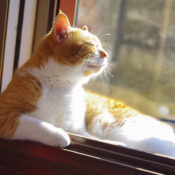
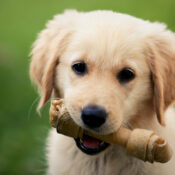
Comments
NORA,
thank you for your note and for sharing your story with me. there is great comfort in the collective emotions (grief being the biggee) i am learning we all experience from training, having, loving and – in one way or another – letting go of a dog. you say you’re not sure you would have ‘the guts’ to do what i did. well, i’ve never had to put a dog down…that seems even more impossible. and, i can completely understand that you are rethinking whether you could train another dog. so am i, as i contemplate raising another guide dog puppy. it is a massive undertaking (with a massive payoff) that many volunteers do over and over again (how?).
i am still anxiously waiting to see where LESTER winds up. she is such an eager-to-please, joyful, confident dog so i am hoping she graduates to be the guide dog i believe she can be. wherever her journey takes her, i hope she will be happy and live a long, full life. even with all of the training challenges and all the tears i am still crying, i can whole heartedly say i don’t regret a minute of it. it was a privilege to raise her and be her person for the first 17 months of her life.
First, let me put down my wet Kleenex and say that as a dog lover/trainer for over 30 yrs I was painfully reminded of how hard it was for you to let go of Lester. I relived the sad days when I said goodbye to both my happy, well trained German shepherd who started as a 4 lb. ball of fluff, and later to put down her successor, a lonely sheltie we adopted at two & had for 16 yrs. Tho I know early love & socialization are vital to dogs, I judge that I wouldn’t have the guts to do what Devra did. I hope you have plenty of pictures for your scrapbook. Your fur buddy Lester will be in your heart forever.
I’m rethinking whether I could train myself to have the discipline & courage to start another puppy from scratch. I remember the patience it took to help them learn what I chose to teach, but what is left is the warmth of love they left in me. Besides horses, if you have a good photo, you can have it put on a mug. When I drink my tea I have either Steven Sheltie, a gifted herding dog, or Juno, “the fur nose rescue dog”, join me on my mug. They make a tea break warm my heart as Lester will yours. Generously, you have given a blind person the best gift they could ever have. Grace & joy to you for sharing your story, Devra. Through the tears, it has a happy ending.
Tom Goodwin – thank you for your lovely note. (sigh)
“….someone unlucky enough to need her is going to be very lucky to have her.”
Yup.
Beautiful. That’s why you do it, eye on the prize as you say.
I’m proud of you too.
once again bob, thank you for your lovely and thoughtful note. i appreciate your advice about spending time with horses being therapeutic. i think i’ll reach out to jasper’s person to arrange a visit!
Thanks Devra, for this third installment of your odyssey with Lester raising her to be a wonderful guide dog because you’ve been such a wonderful, caring pet mommy all the way from the beginning. You’ve perfected the right blend of being a fun mom with teaching her what she’ll need to know for ‘work’ but cleverly disguising it.
I loved the part here where you talk about Jasper, the horse. They’re such magnificent, healing beings. I can see how Lester would have perceived him as a large dog. There are a lot of commonalities between the two. Although having her gone will get easier in time, it’s still painful. If you have access to spending time with some horses, you definitely should.
Now that the weather’s been better I’ve taken to working with some horses as a volunteer in Valencia, and it’s been very therapeutic. Riding is wonderful, but just being in the horse’s presence, making eye contact and petting the front and sides of their head takes so much stress away. They just saunter right on over to me. I love every minute of it.
Lester was a joy to work with, and a very smart dog. You’ve gotten glowing reports on her over the past 8 weeks. You’ve succeeded and then some with what you set out to do. Intellectually is one thing, emotionally is quite another. Just let yourself feel what you feel when you feel it. Take other people’s advice with a grain of salt if it doesn’t feel right. They mean well.
I’m also proud of Lester and all she’s accomplished so far, and was glad to read you’re proud of yourself. You should be. I’m proud of you too.